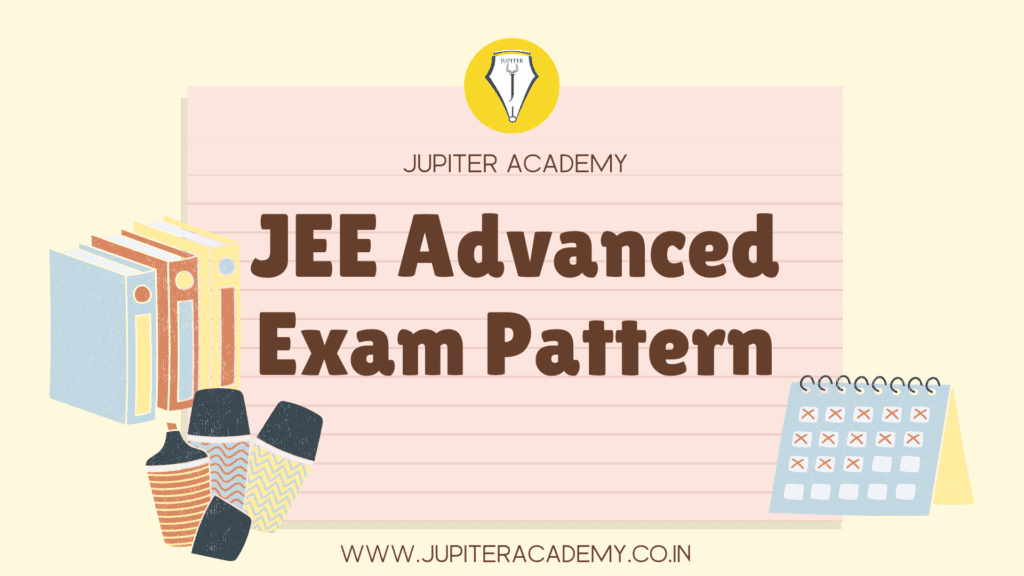JEE ADVANCED EXAM PATTERN
Highlights of JEE Advanced Exam Pattern
Some of the key highlights of the exam pattern are;
Thank you for reading this post, don't forget to subscribe!- The main exam will be conducted in computer-based mode.
- JEE Advanced consists of 2 papers (Paper 1 and Paper 2) and candidates have to appear for both the papers.
- The question paper consists of three parts: Physics, Chemistry and Mathematics.
- There are MCQs and numerical answer type questions which candidates have to attempt.
- An interesting feature of the JEE Advanced exam is its marking scheme which comprises full, partial and zero marks scheme.

JEE Advanced 2021 Exam Pattern
As mentioned above, the exam consists of two papers viz. paper 1 and paper 2. JEE Advanced Paper 1 and Paper 2 further constitute a total of 54 questions each. The paper is also divided into three sections: Physics, Chemistry and Mathematics, each having 18 questions. In total, the exam is of 306 mark where each paper carries a total of 183 marks. The duration of each paper is 3 hours and is conducted in either Hindi or English medium. During the exam day, paper 1 usually begins at 09:00 am and goes on till 12:00 pm. Paper 2 starts from 2:00 pm to 05:00 pm.
JEE Advanced Paper 1 pattern (Same for Physics, Chemistry and Mathematics)
| Section | Types of questions | No. of questions | Maximum Marks |
| Section 1 | MCQs with one or more than one correct answer | 6 | 24 |
| Section 2 | Numerical value answer type questions | 8 | 24 |
| Section 3 | Paragraph based questions (2
paragraphs, each having 2 MCQs with one correct answer only) | 4 | 12 |
JEE Advanced Paper 2 pattern (Same for Physics, Chemistry and Mathematics)
| Section | Types of questions | No. of questions | Maximum Marks |
| Section 1 | MCQs with one or more than one correct answer | 6 | 24 |
| Section 2 | Numerical value answer type questions | 8 | 24 |
| Section 3 | Matching type questions with 4 options | 4 | 12 |
check out : previous year JEE mains question papers
JEE Advanced Marking Scheme Paper 1
| Section | Question Type | Total Questions | Full Marks | Partial Marks | Negative Marks | Maximum Marks |
| 1 | MCQs with 4 options (one or more than one correct options) | 6 | +4 if only (all) the correct option(s) is (are) chosen | +3 if all the four options are correct but only three options are chosen
+2 if three or more options are correct but only two options are chosen, both of the options must be correct +1 if two or more options are correct buy only one option is chosen and it must be correct | -2 (in all other cases) | 24 |
| 2 | Numerical value answer type questions | 8 | +3 if only correct numerical value is given | – | – | 24 |
| 3 | Paragraph based questions (2
paragraphs, each having 2 MCQs with one correct answer only) | 4 | +3 if only the correct option is selected | – | -1 in all other cases | 12 |
| Possible response | Section 1 | Section 2 | Section 3 |
| Not attempted | 0 | 0 | 0 |
| Partial Correct | +1 for each correct option selected | 0 | 0 |
| Correct | +4 | +3 | 3 |
| incorrect | -2 | 0 | -1 |
JEE Advanced Marking Scheme: Paper 2
| Section | Question Type | Total Questions | Full Marks | Partial Marks | Negative Marks | Maximum Marks |
| 1 | MCQs with 4 options (one or more than one correct options) | 6 | +4 if only (all) the correct option(s) is (are) chosen | +3 if all the four options are correct but only three options are chosen
+2 if three or more options are correct but only two options are chosen, both of the options must be correct +1 if two or more options are correct buy only one option is chosen and it must be correct | -2 (in all other cases) | 24 |
| 2 | Numerical value answer type questions | 8 | +3 if only correct numerical value is given | – | – | 24 |
| 3 | Matching type (List I and List II) questions with 4 options | 4 | +3 if only the correct option is selected | – | -1 in all other cases | 12 |
| Possible response | Section 1 | Section 2 | Section 3 |
| Not attempted | 0 | 0 | 0 |
| Partial Correct | +1 for each correct option selected | 0 | 0 |
| Correct | +3 | +4 | +3 |
| Incorrect | -1 | -2 | 0 |
Benefits of Knowing The Exam Pattern of JEE Advanced
There are several benefits of knowing the exam pattern for JEE Advanced.
- It helps candidates in improving their preparation level. It acquaints aspirants with the number and types of questions.
- It also gives a clear introspection about the negative marking system that helps examinees to reduce their errors.
- Develop better time management skills as well as speed and accuracy for the exam.
So, before even starting IIT JEE preparations, it is advisable to have a look at the JEE Advanced paper pattern. It will help you to eliminate the basic errors which you could make during the examination due to the lack of information regarding the marking scheme.
Apart from this candidates should also get a complete overview of the JEE Advanced syllabus. This is an important study material which students should not ignore. Instead, they should go through the syllabus and with the information that is provided in the document they will be able to form a more effective study plan and strategy.
About JEE Advanced
JEE Advanced which is the second phase of JEE is a national level engineering entrance examination conducted by different zonal IITs usually on a rotational basis every year. Candidates who qualify in the JEE Mains are eligible to appear for IIT JEE Advanced. Further, students are granted admissions into some of the top Indian IITs and NITs or CFITs, etc on the basis of ranks obtained in JEE Advanced exam.
